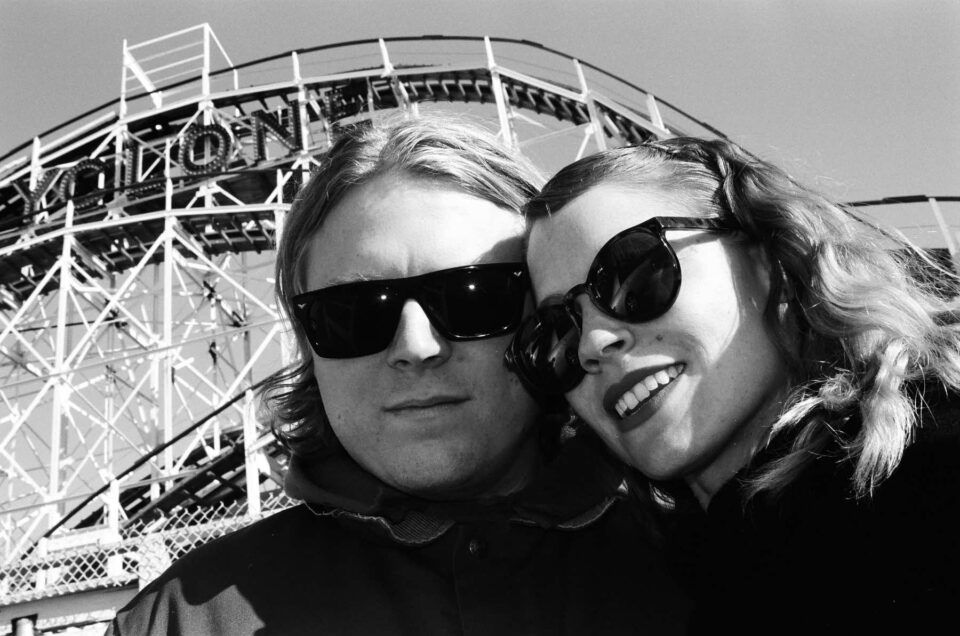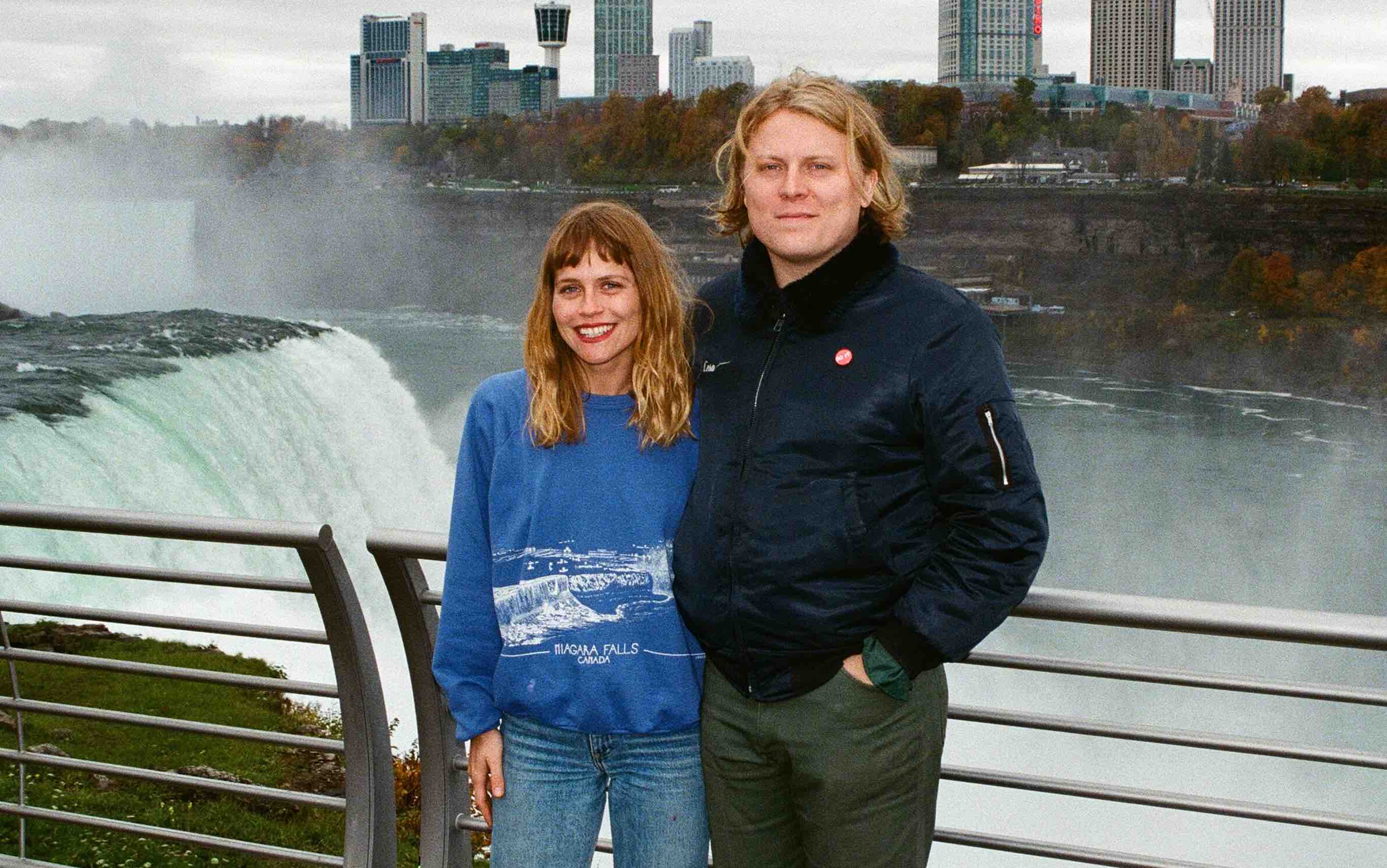“I didn’t necessarily set out to do anything specifically with this album,” says Ty Segall of his new record Three Bells. “But I did know I wanted to do something, you know, epic.”
The 15th solo album from the prolific songwriter is epic, indeed. Its sprawling 15-track mosaic includes plenty of recognizable chunks from Segall’s usual musical touchstones (guitar psychedelia, garage rock, early-’70s glam and prog) which he keeps finding arresting new ways to mix, match, and juxtapose. With the exception of the heavy-riffing “Move,” which was recorded with members of his Freedom Band, Segall plays drums on all of Three Bells’ tracks, a move which helps give the album its quirky sense of internal logic.
A deeply immersive listening experience, Three Bells is the kind of record that really gives the listener a sense of being taken somewhere, though according to Segall the journey in question is one to the center of himself. “It’s very much in line with the conceptual form of most of my records, which is diving into oneself and really swimming around and trying to get as deep as you can,” he explains. “There’s some ego death, some harsh looking, some trip-outs, and some lightness as well; it’s all in there.”
Assisting Segall in his Three Bells explorations is his wife, Denée. The couple have often collaborated in the past, both on Segall’s albums and with Denée’s band The CIA. But this time out, Denée has co-written a third of the album’s songs, sings lead on “Move,” and her presence is additionally felt on the closing tracks “Denée” and “What Can We Do.” Therefore, we thought it would be fun to get them both on the line for a chat.
Ty, your last album, 2022’s Hello, Hi, was an acoustic-oriented affair. Was this new album a reaction against that?
Ty Segall: It actually was a continuation of it, kind of, because most of these songs were written on the acoustic, and I hadn’t written many tunes on the acoustic until the Hello, Hi songs.
What’s the difference for you between writing on acoustic versus writing on electric, at least in terms of how that affects the songs that result?
Ty: There’s just a different relationship to melody and sonic space with an acoustic instrument versus an electric one. You’re playing with different harmonics and different kind of tonality relationships; with electric, you utilize the amp as part of the instrument, or an effect as part of the instrument, and with an acoustic there’s none of that stuff. There’s lots of different things you can do, but it definitely informs where you go.
With the songwriting on the guitar for this record, I used a lot of similar chord shapes with my left hand that I would just slide around; these are shapes where I don’t know the actual name of the chord—a fifth or a seventh or something like that—but if you just slide it up and down the neck, it creates a drone or some sort of tension. You could definitely do that on the electric, but it would be a different kind of tension.
“I kind of reserve our collaborations for a special ‘home run’ move, because I think it’s a really unique thing, the shared voice that we come up with together.” — Ty Segall
You and Denée co-wrote five of the songs on Three Bells. Was this something that just kind of happened, or was that always part of the plan?
Ty: Denée and I have been collaborating lyrically for the past few years. I kind of reserve our collaborations for a special “home run” move, because I think it’s a really unique thing, the shared voice that we come up with together. So there were a couple parts of the record where I was like, “OK, I think this should be a thing that Denée and I do.”
Something on the record like “My Best Friend”—that’s the two of you actively collaborating on the lyrics?
Denée Segall: Yeah, I would say that one was pretty 50-50, if I remember correctly.
Ty: That one was kind of a fun, bouncing-back-and-forth kind of thing. “Oh, here’s a cool pun on this.” “Oh, should we say this?”
Denée: That one came about very quickly; it was just like a “he’d say a line, I’d say a line” kind of a thing.
Ty: That one was like, “Hey, I got this kind of bouncy riff, it kind of reminds me of Herman—should it be the Herman song?” [laughs]. Herman’s one of our dogs, Herman and Fanny. There’s already a Fanny song—“Fanny Dog,” the first song on Freedom’s Goblin—so I thought we should do a Herman song.

“Void,” the album’s second track, feels very much of a piece lyrically with “The Bell.” Was that an intentional juxtaposition?
Ty: Yeah, I mean, it’s almost the thesis statement of the whole record, those two songs back-to-back. I felt a little like I was hitting a wall, lyrically, and I felt like Denée’s style would really match, especially if you’re speaking about them as if “The Bell” is the question and “Void” is the answer, or if there was a call-and-response-type relationship with those two songs. Which isn’t really what it is, but I wanted a different kind of lyrical feeling to “Void” than “The Bell,” and so I thought us collaborating on it would be perfect.
Tell me about “Move,” the one song that Denée sings lead on. How did that one come about?
Ty: When we were doing the First Taste record [in 2019], I had a full album written, and then I also wanted to just kind of jam stuff up on the spot. We did a whole 30 minutes of stuff that hasn’t been released, and one of those things was a cyclical riff that Emmett [Kelly] came up with, and I was on the drums and Charles [Moothart] was on the drums, and then I kind of finished it. During the Harmonizer record, I took that riff out and added kind of a chorus thing; then we did the session with the band, and I was like, “OK, there it is—there’s the tune!” I immediately thought that this should be the one that Denée writes and sings, and I’ll do the backups. And then I just kind of threw it over to her.
Denée: Yeah, this one was pretty similar to “Feel Good” [from Harmonizer], where Ty just came to me with a loose concept and then kind of let me figure out the lyrical melody and write a good chunk of it. And then we spitballed back and forth together to finish it out.
“We are an extremely communicative couple, so I feel like I know exactly what he’s trying to express, and that’s why it works so well. I can just help him to say it in a different way.” — Denée Segall
Is there an overall concept behind the album?
Ty: Before people have the chance to either put their own meaning into it or try to figure it out a bit, I wanna leave it a little bit more abstract. But there definitely is a “thing” to it. I like to think that most of my records have a loose concept or through line; but this is me trying to dive as deep as I can, and I think I dove pretty deep.
Denée: Probably the deepest you’ve ever gone [laughs].
Ty: And I don’t think I could have gone as deep if I didn’t have someone, especially Denée, to bounce certain things off of—someone who knows me so well and knows what the goal of the record is. To have that kind of conversation was essential to the lyrical content of the record. Artistically, she’s the voice of reason when I need someone to help me figure out if something is good or bad; she’s the one I trust the most, more than myself.
Denée: We are an extremely communicative couple, so I feel like I know exactly what he’s trying to express, and that’s why it works so well. I can just help him to say it in a different way.
Do you have a philosophy when it comes to songwriting?
Ty: I think the only thing that’s a constant in me making stuff is me trying to not be consistent in any specific way. Which might be a frustrating thing for anyone who listens to my music, but it’s kind of the only way I can continue to try to find new nooks and crannies to explore, musically. Maybe my philosophy is just to try to make interesting stuff. I used to think that I just wanted to make one quote-unquote classic record or something, but I’ve come to learn that I don’t think I’m ever gonna be satisfied with anything I make.
Denée: You don’t get, like, bored of what you’ve just done, but you’re constantly onto the next idea and getting excited to try a different thing.
Ty: Well, I think If I focused for too long on the one thing, I might end up completely hating it forever. Or just getting bored.
Denée: Yeah, I think maybe that is the case [laughs].
Ty: I’ve learned to not listen to a record I’ve made—or think about it at all, really—until it’s about to come out. I would’ve already been bored of it by now and not want to have anything to do with it if I’d paid attention to it more [laughs].
“I like to think that most of my records have a loose concept or through line; but this is me trying to dive as deep as I can, and I think I dove pretty deep.” — Ty Segall
How long has it been since you’ve listened to it?
Ty: I actually just started listening to it again, because I’m learning it so we can play it live. But I took some serious time off.
Denée: I listen to it a lot, though—just not when he’s around. I listen to it in the car a lot, by myself.
Ty: I’m trying to remember what I did on the songs right now, which is fun. I just need space away from this stuff. If I’m too close to it, I, start to pick it apart, and that’s not fun for me.
Denée: And this was also the longest he’s ever worked on a record. So I think the break was much needed.
How long did this record take?
Ty: I don’t know. I think the first tune I wrote for it was maybe, like, two years before we finished it. But the bulk of it was closer to a year and a half. It was an ongoing thing, for sure. I tried for a triple album and I couldn’t do it [laughs].
Next time!
Ty: I don’t know. Who even wants that? That’s what I realized with this record. I’m like, “Nobody wants a triple album!” FL









